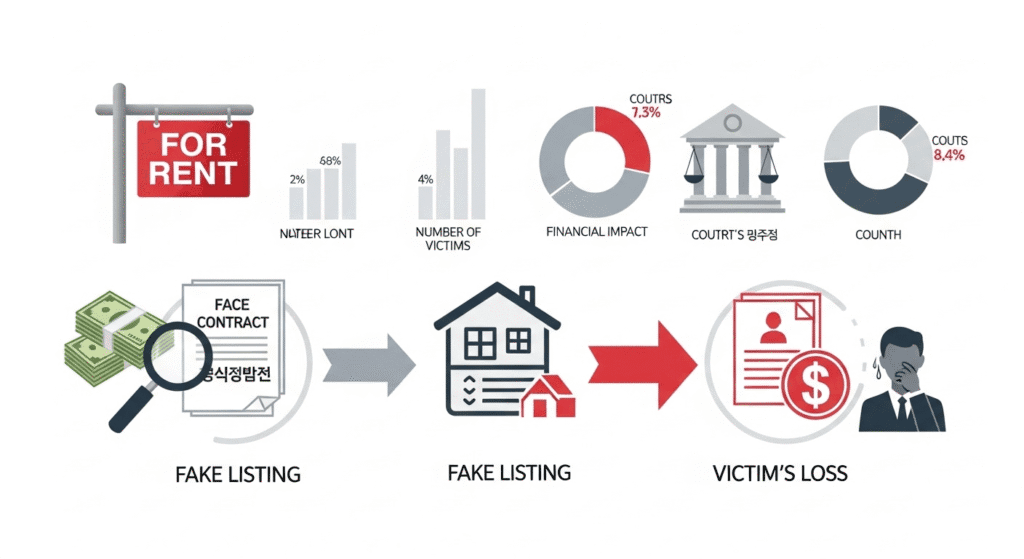This korean housing scam case study is based on a real situation involving a foreign resident in Seoul who nearly lost a large deposit during a rental contract negotiation. Housing fraud targeting foreigners is more common than people think, and most victims don’t realize the warning signs until it is too late. In this case, our team prevented a major financial loss by identifying inconsistencies, verifying critical documents, and confronting the fraudulent party with solid evidence.
Understanding Why Foreigners Are Targeted in Korean Housing
Foreigners searching for housing in Korea face multiple disadvantages: limited language skills, lack of familiarity with the rental system, and an overreliance on real estate agents or landlords who may not always act in their best interests. This environment creates the perfect opportunity for fraudulent actors to exploit gaps in understanding and documentation.
Among the most common traps are unclear ownership records, fake contracts, unpaid taxes on properties, forged bankbooks, or landlords who intend to disappear after receiving a deposit. These issues are rarely obvious at first glance, especially for newcomers unfamiliar with the complex housing structure in Korea.

A Korean Housing Scam Case Study: The Foreign Tenant Who Nearly Lost Everything
This case began when a European resident was searching for a new apartment after their company-provided housing expired. The client found a place listed at an unusually low deposit compared to similar units in the same district. The price seemed too good to be true—but the client believed they had found a great opportunity.
When the client contacted us for a routine document check, they did not suspect anything unusual. However, this request quickly escalated into a potential fraud investigation. As we examined the property details, several inconsistencies emerged that indicated the landlord had concealed critical information.
Initial Red Flags We Discovered
During our early review of the listing and documents, we identified warning signs that commonly appear in scam situations targeting foreigners:
- Property ownership history did not match the landlord’s claims.
- Tax arrears were discovered through official registry checks.
- The landlord refused to share a verified ID or family registry.
- The contract format contained outdated legal clauses.
- The deposit was significantly lower than market standards.
These discrepancies triggered the need for a deeper investigation, which ultimately revealed the landlord’s connection to previously reported fraudulent activities. At this stage, the client understood they were at serious risk.

How We Verified Ownership and Exposed the Fraud
To protect the client, we initiated a structured verification process. This involved cross-referencing property documentation, validating ownership through legal channels, and identifying discrepancies in the landlord’s statements. Below are the exact steps our team used:
Step 1: Registry Extraction and Owner Verification
We obtained a fresh certified copy of the property registration. This document revealed that the person presenting themselves as the landlord was not the legal owner. Furthermore, the actual owner had multiple liens and debts attached to the property, making any rental contract unsafe.
Step 2: Background Check on the Landlord
Our research revealed the landlord was involved in multiple disputes, including illegal subleasing cases. This confirmed our suspicion that the landlord was attempting to obtain deposits from multiple foreigners through separate fake contracts.
Step 3: Contract Line-by-Line Audit
We conducted a detailed review of the rental contract itself, identifying clauses that were intentionally vague or contradictory. Several sections referenced legal articles that no longer existed, indicating the document was copied from outdated templates commonly used in fraudulent schemes.
Step 4: Direct Confrontation With Evidence
After collecting sufficient proof, we confronted the fraudulent landlord. Upon realizing that their identity and property inconsistencies had been exposed, they immediately ended communication. This reaction confirmed the scam attempt and eliminated the risk of the client proceeding with the contract.
The Outcome: Preventing Financial Loss Through Evidence and Verification
Because the client sought assistance before transferring any money, we successfully prevented a substantial financial loss. Had the client signed the contract or paid the deposit, recovery would have been extremely difficult due to the fraudulent landlord’s past behavior and legal strategy.
Immigration status, employment stability, and personal finances would have been significantly affected if the deposit had been lost. Fortunately, early intervention allowed the client to avoid months of stress, legal conflict, and potential relocation issues.
What Foreigners Can Learn From This Case
This korean housing scam case study demonstrates why foreigners must approach the Korean rental market with caution. The combination of language barriers, unfamiliar systems, and the complexity of contracts makes it easy for scammers to take advantage of new residents.
- Always verify property ownership through official channels.
- Never trust unrealistically low deposit listings.
- Ensure the landlord’s identity matches the property registry.
- Check for outstanding tax issues or liens that threaten the contract.
- Have all documents professionally reviewed before signing anything.
Related guide: Finding Housing in Korea
Need Help With a Housing Situation?
Foreign residents in Korea often face unexpected challenges when navigating rental agreements. Whether it involves document verification, landlord communication, or spotting fraud, having support can make the difference between security and a costly mistake.
JS Network: Solving Korea’s ‘Expat Nightmares’
Colin (Founder) | U.S. MBA | 11+ Yrs Global Experience
My Expertise:
• Expat ‘Nightmare’ Solutions (Visa, Housing, Banking)
• Global Trade & K-Product Sourcing (B2B/B2C)
• Premium Concierge & Travel Support
Contact Now:
📧 [email protected]
📱 Chat on WhatsApp | Chat on KakaoTalk
We respond quickly to all inquiries, but for 24/7 “URGENT” assistance (like a lost ARC or visa issue), please use Kakao/WhatsApp.
(All services are provided in conjunction with appropriate affiliated professionals (lawyers, administrative agents, judicial scriveners, etc.))
© JS Network Co., Ltd. | Expat ‘Nightmare’ Solutions 🌏 www.jsnetwork.co.kr


